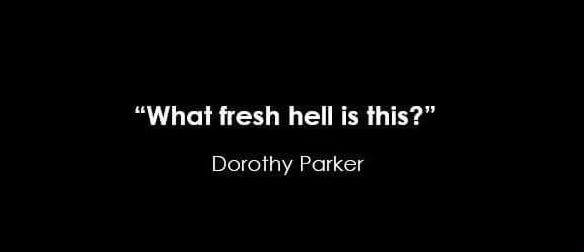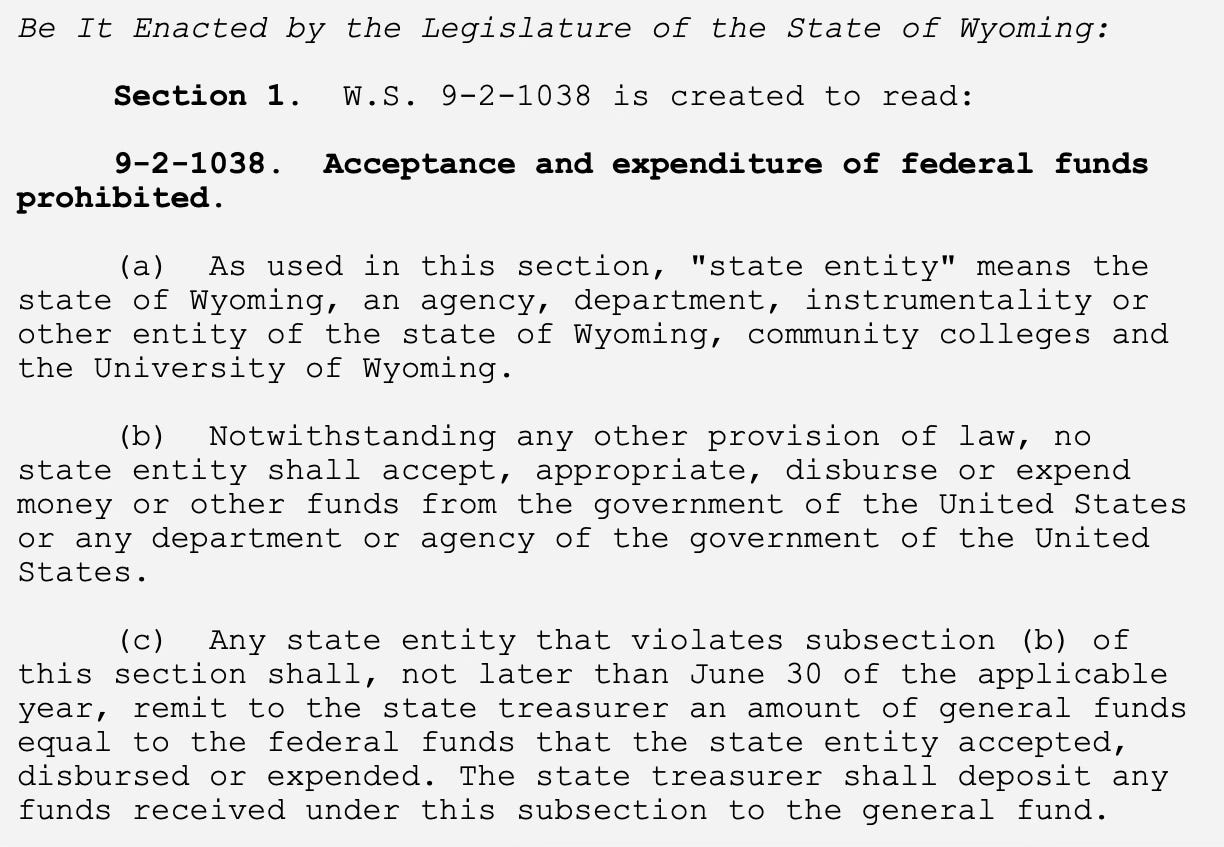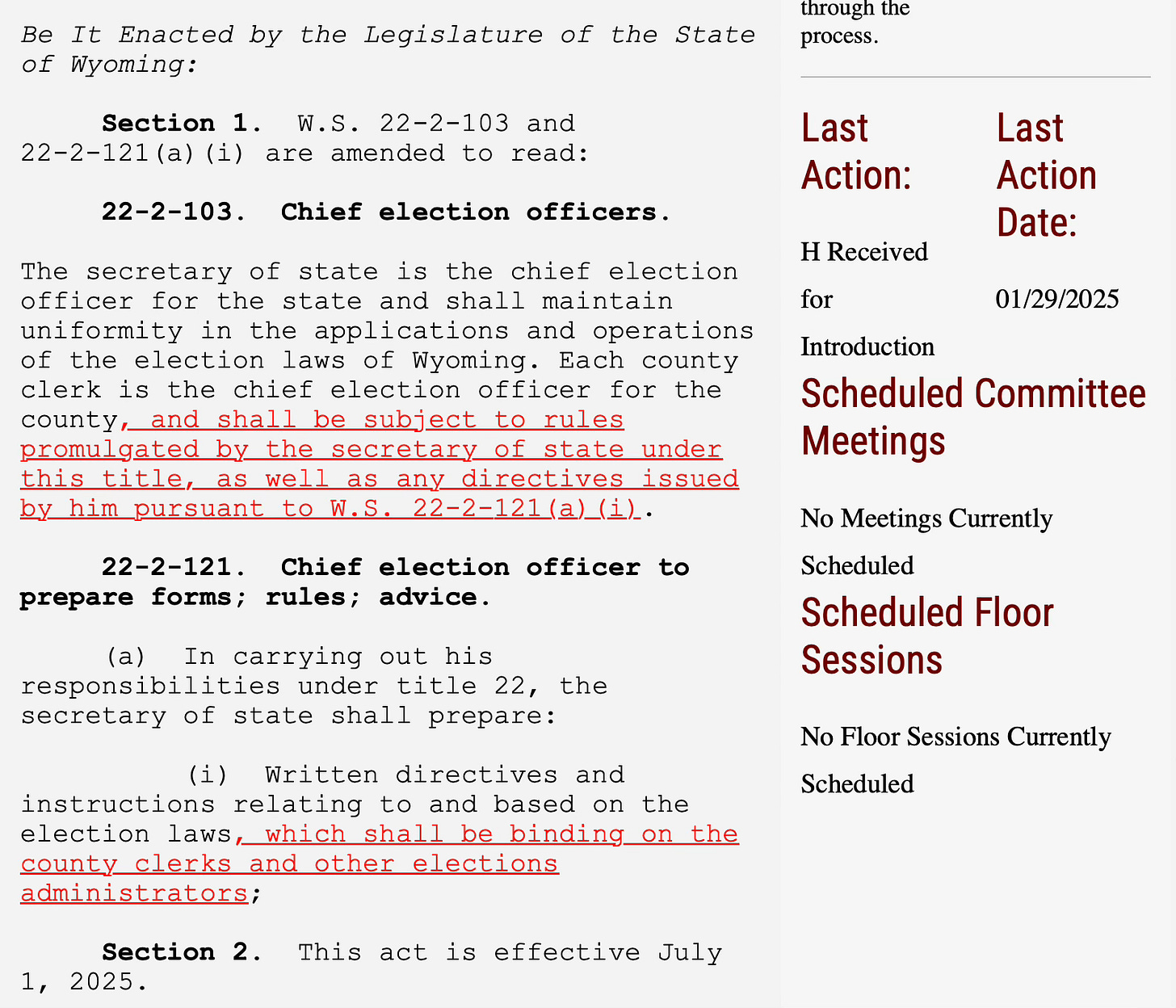Politics in 2025 Wyoming Legislature
Three weeks into the legislative session, here's an overview of some of the bills flying under the radar as well as the politics driving some of them.
The hunger for power
I swear this Wyoming Legislature is killing brain cells. The changes proposed to our state’s education system are stunning, lack accountability measures, and some will surely end up in court. In this legislature we are witnessing a rejection of limited and local government. We’re also seeing naked political maneuvers to settle scores and shift power.
With about 350 bills filed in the House, and about 200 in the Senate, my hope is that the majority of the bills will die or be killed. Sure there are some good bills, but they are overshadowed by bills that seem absurd or destructive, while others are all about shifting power. I’ll give a snapshot of some of these bills below, but first let’s look at a bill that takes aim at the reserve funds held by county governments.
Note from Cat: Your support for Range Writing is appreciated. If you aren’t already a subscriber, please consider subscribing now. It’s free, and the latest posts will be delivered straight to your inbox weekly.
Gutting county reserve funds
On Monday, Feb. 3rd, the House Corporations Committee will consider HB262 that limits county reserve funds (assuming the committee can finish up with a 40-page bill banning electronic voting equipment and requiring all elections to go back to paper and pencil, with hand-counting of ballots). This meeting will be held during the noon recess. Get the details here.
Senator Laura Taliaferro Pearson (of Kemmerer who represents Sublette County along with parts of three other counties) is a co-sponsor of this bill that proposes “Beginning July 1, 2025, no county shall hold excess funds that exceed the county’s annual spending amount.”
Pearson's bill, if enacted, runs over the top of our Sublette County government – part of her constituency. Sublette County has tucked away reserves during boom years to help pay for government services and operations during bust years, and to save for equipment and building replacements and landfill closures.
If you are a Sublette County resident upset about the county placing money into reserves, go talk to your county commissioners. They are the elected officials who set the mill levy and control how much goes into reserves and how much is spent each year. This bill is a legislative attempt to override county officials. What happened to local government is best?
Senator Pearson represents Sublette County. Did Pearson ask the boards of county commission of the four counties she represents if they support her gutting their reserves? I’d bet not.
Pearson’s bill comes at the same time that Sublette County Treasurer Emily Paravicini warned the Sublette County Commission that revenues have substantially declined and that they are going to need to tap into reserves to pay bills. You can listen here to Treasurer Paravicini’s discussion with the commission from January 21, 2025. The commission will meet Tuesday, Feb. 4, at 9:30 a.m. to discuss reducing county spending.
Like my work? Buy me a coffee.
A messy snapshot
Now to other proposals that seek to shift power, that chip away or override local government authority, and my view of what’s driving some of them. Of interest to Sublette County voters, I’ve noted when our elected senator and representative have a hand in these bills.
Banning federal funds
House Bill 340, sponsored by Evanston’s Representative Bob Wharff, would prohibit any state entity (see definition below) from receiving any federal funds. Since Wyoming receives from $2.3 billion to $2.9 billion per year, the economic ramifications to our state would be severe. This bill was filed on Thursday, but I’d love to see it proceed to the floor so we could record the legislators who would support such destruction of this great state. On the campaign trail in 2022, then-candidate Mike Schmid of LaBarge (who won the House District 20 seat in 2024 and who now aligns with the Wyoming Freedom Caucus), said Wyoming needs to wean itself from federal funding.
Enforcement of Localities
Representative Wharff is also cosponsor of Senate File 85, the “constitutional enforcement of localities” that would allow legislators to compel the Wyoming Attorney General (AG) to investigate ANY action taken by the governing body of a county, city or town if a legislator alleges a violation of state law or the constitution. The AG would be required to investigate and issue a report, and if the local government happens to disagree, no matter, as the law would require the State Treasurer to withhold any undistributed state revenues from the local government until the local government complies with the AG’s opinion.
That a local government may have a different view of the legality of its actions than the Attorney General apparently doesn’t matter. This bill is also significant in light of efforts to make the Attorney General an elected position. (More on that in a minute.)
Empowering Chuck Gray
HB322 declares the Secretary of State’s authority over County Clerks for all election-related matters and requires the clerks to be bound not just by any official rules issued by this elected official, but also “any directives” issued by him.
Current Secretary of State Chuck Gray is annoyed those pesky county clerks – each county’s chief election officer – tend to ignore his claim that ballot boxes are illegal. Those county clerks’s abide by state statutes and state administrative rules, not to Gray’s letters and press releases.
Making more offices political, & overruling locals
House Joint Resolution 6 seeks a constitutional amendment to make judges and justices elected offices in Wyoming. Doesn’t that sound fun? Campaigns and campaign financing for judges? Political judges? Fun fact: both the representative and senator representing my district are backers of this bill. Representative Mike Schmid (LaBarge) is the bill’s sponsor, with Senator Laura Taliaferro Pearson (Kemmerer) a cosponsor.
Judges and justices are currently appointed by the governor from a list of three nominees submitted by the judicial nominating commission. Each appointed justice or judge must then stand for a retention vote on the general election ballot for each term in office. The nomination committee includes three resident members of the Wyoming Bar Association, the chief justice of the Wyoming Supreme Court, and three non-lawyer electors appointed by the governor.
The one good thing about this proposal for a constitutional amendment is that it puts this issue to a vote of the Wyoming people – something this legislature isn’t willing to do for other issues such as the huge changes it proposes to our state’s educational systems or abortion. But then again, the only reason the election of judges is being proposed to the voters is that the legislature doesn’t have the power to do it on their own.
Making more elected offices political is at the heart of another bill. Senate File 98 would require candidates for school board trustees to have their party affiliation printed on general election ballots. These seats are currently nonpartisan, but this bill will bring party politics into local school board elections.
In another odd move away from local control, the Schmid/Pearson duo are cosponsors of HB313 that would allow the state transportation commission to overrule a board of county commission decision on lowering speed limits on streets or highways within their jurisdictions. It was once a tenet of conservatism that “The most effective, responsible, and responsive government is the government that is closest to the People.” That’s still in the Wyoming Republican Party platform, but ignored when convenient.
Now to the Attorney General
It appears that some members of the Wyoming Legislature are carrying water for Secretary of State Chuck Gray’s quest for more power as his attempts to butt in on the governor’s authority have largely failed. Gray has flamboyantly used his position as Secretary of State in apparent preparation to make a run for an office with more power.
HB327 would place the Attorney General under the control of the state loan and investment board instead of the governor. Currently, the governor appoints the AG, with the appointment either confirmed or rejected by the senate. The changes in this bill have broad implications, as indicated in the 20 pages of the bill that replace all of the governor’s authority with that requiring majority votes from the state loan and investment board.
Every action – appointing the directors of the division of criminal investigation, law enforcement academy and victim services; finalizing settlement agreements, initiating or dismissing lawsuits and seeking injunctions; participation on an interstate crime commission; appointing assistants and hiring support staff, retaining specialized attorneys and investigating cases regarding misconduct by public officials – could only occur after a majority vote of the state loan and investment board. The board consists of the governor, state treasurer, state auditor, state superintendent of public instruction, and secretary of state. While serving on boards together, disagreements between Gray and Governor Mark Gordon are frequent, like this one, and this one, and this one.
This bill is one way to make the Attorney General’s job both more difficult and political: instead of working for one executive, the AG would work for five, and would require continuous majority votes of a board to do their job. If passed, this law would require the state loan and investment board to appoint an AG no later than January 31, 2026 for confirmation consideration by the Wyoming Senate during the 2026 Budget Session. Representative Scott Heiner (District 18) is the sponsor of this bill.
Heiner is also sponsor of HB102 which would make the Attorney General an elected position, with Senator Pearson as a cosponsor. Apparently it irks them that the state’s top elected official (the Governor) has control of the executive branch, but the Wyoming Constitution is clear: "The executive power shall be vested in a governor …”
I’m sure supporters of the bill hope for a team like that of Texas’s Governor Greg Abbott and AG Ken Paxton, but they could end up with a governor and attorney general at odds with each other and a very politicized Wyoming legal system.
Another piece of the pie attempting to take away the governor’s authority as the state’s top executive is HB240, which Senator Pearson is a cosponsor. This bill would repeal the state law that allows the governor to appoint an acting secretary of state. Under current law, "In case of removal from the state, or impeachment of the secretary of state, the governor shall appoint an acting secretary of state, who shall take the oath herein prescribed and perform the duties of the office during absence occasioned by the removal or pendency of impeachment."
I find humor in this bill, since it indicates that the governor can’t be trusted while the secretary of state is out of state. Perhaps some fear that the governor would appoint an acting secretary who would issue some directive that the secretary would feel the need to rescind upon his return?
The Wyoming Constitution includes a provision that when the governor is absent from the state, the secretary of state acts as governor until the governor returns. In Idaho, the lieutenant governor took advantage of Governor Little’s absence due to out of state meetings in 2021 to pass executive orders which were then promptly rescinded when Governor Little returned.
Another bill that would diminish the staying power of a governor’s policies is HB227 that would have a governor’s executive orders automatically expire at the end of that governor’s term in office. Neither the Wyoming Constitution nor current state statutes regulate these executive orders. The Legislative Service Office notes that a governor may issue executive orders to execute laws, but he cannot make new law through an executive order, although “Clearly identifying that dividing line can be difficult.”
Why so much legislative focus on shifting power in the executive branch?
In my view, many of these bills reflect Secretary of State Chuck Gray’s desire for more power and serves as a sort of retaliation for Governor Gordon’s rejection of Gray’s power ploys – especially in the abortion debate. Secretary Gray attempted to intervene in a lawsuit to assert his viewpoint opposing abortion, doing so in his official capacity, but Governor Gordon and his Attorney General’s office were successful in opposing Gray’s intervention, as the Governor is the state’s top executive. Gray also attempted to enact rules on Environmental, Social and Governance but Gordon vetoed portions of the rules that strayed beyond the Secretary of State’s legal authority. A few months later, Gordon vetoed other rules regarding voter identification for the same reason.
Who is representing you?
Now that have concluded week three of this legislative session, are your legislators communicating with you? Are they keeping you informed, providing updates their constituents can easily access? If not, why not?
What legislation are your legislators putting forth? What bills are they co-sponsoring? Are they casting their votes in support of your rights? If not, why not?
Whose interests are being served by your legislators? Are they supporting legislation that helps you and your neighbors? Are they supporting and empowering your local school districts, local governments and communities?
If they aren’t supporting you and your interests, why should you support them?
They are accountable to you, but you also have a responsibility to let your legislators know how you feel about proposed legislation. The easiest way to do that is by sending a quick message in support or opposition to a bill. Point out the specific bill you are referring to, and let your legislator know you are a constituent. You can send those messages here: https://wyoleg.gov/Legislation/onlineHotline/2025.
You can find all legislators’ emails and all the bills at wyoleg.gov. You can click on "meeting schedule" to see which bills are scheduled each day, or watch live sessions by clicking on “Live & archived video.”
Please be involved in our legislature, be polite and respectful, share your views, and thank the legislator for considering your views. We all need to be involved – Wyoming’s future depends on it.










Thank you Cat! I hope a lot of people are seeing this. I guess this is what we get for such a low voter turnout. My gosh, we must work to remedy that before the next election. Some of this idiotic behavior does seem to have riled some people up who didn’t really understand what voting for these people would bring.
Brilliant. Thank you for what you are doing.